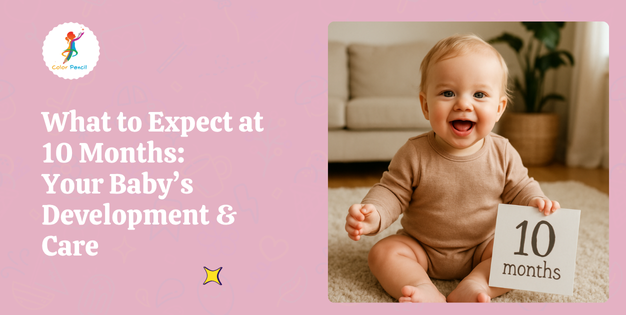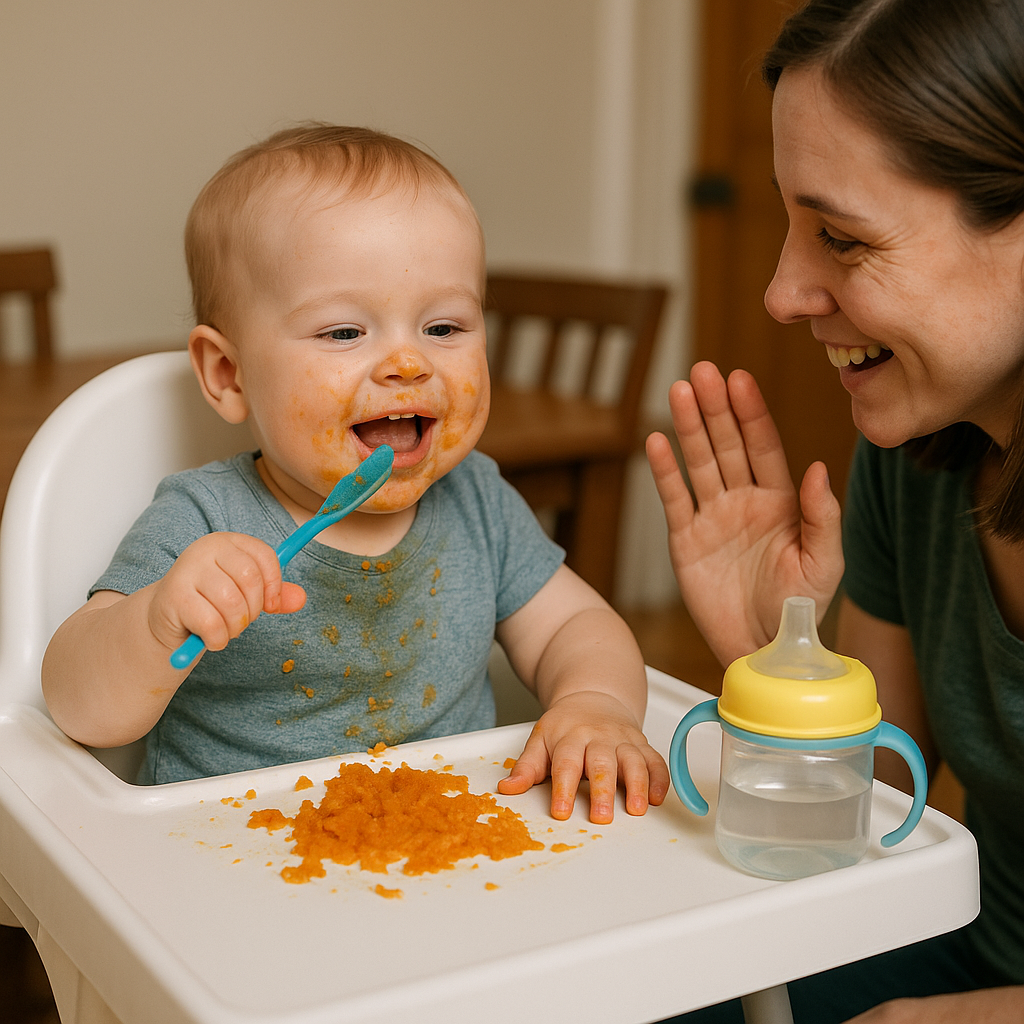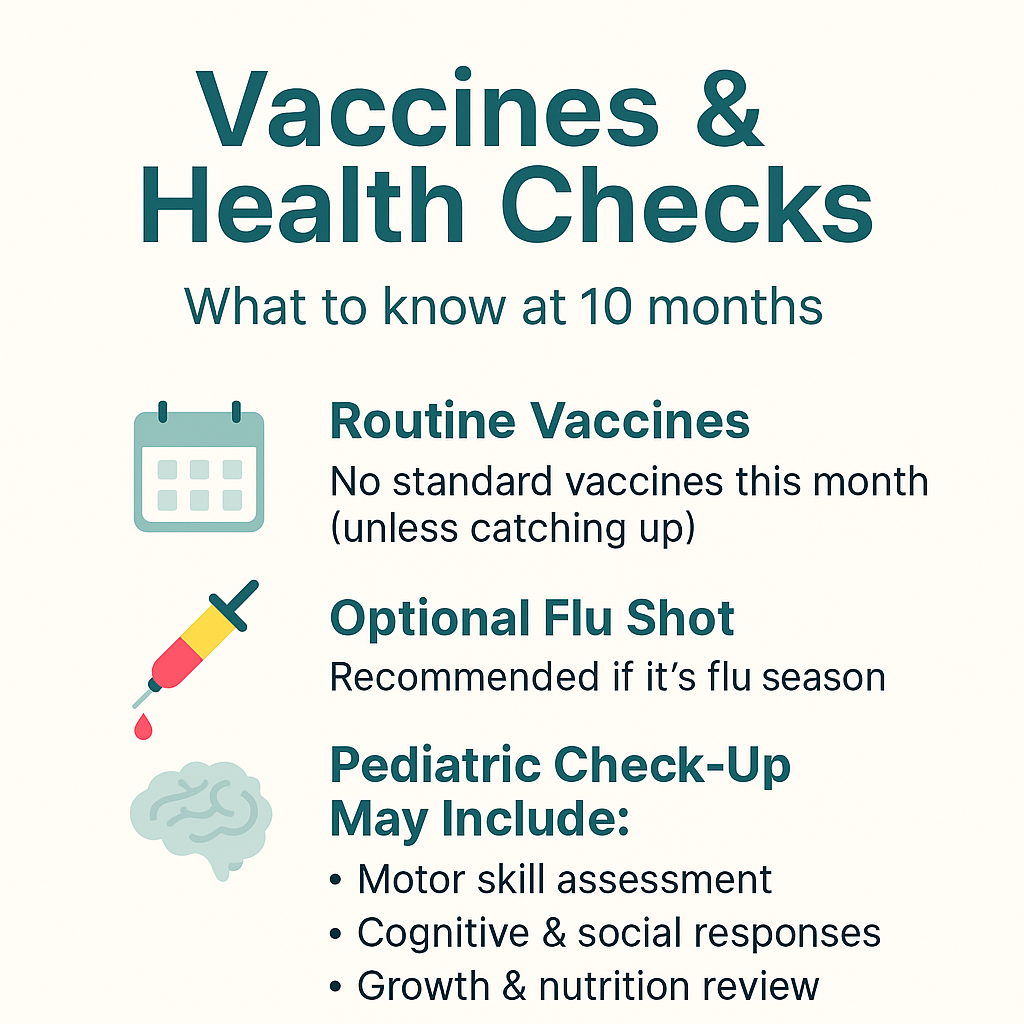Milestones, Growth, Sleep, Feeding, and Practical Tips for the Tenth Month
Your 10-month-old is a busy, curious, and determined explorer. From pulling to stand to cruising along furniture, your baby is gaining confidence and independence by the day. With improved coordination, stronger communication, and clearer preferences, this is a fun and fast-paced stage of development.
Here’s what to expect during your baby’s tenth month.
🍼 Your Baby’s Growth This Month
- Average weight: 8.2 to 11.5 kg (18 to 25 lbs)
- Average length: 70 to 79 cm (27.5 to 31 inches)
- Head circumference: Brain growth continues steadily, supporting new skills like memory and understanding simple instructions
Note: Physical growth may slow slightly as movement increases, but developmental leaps are significant.
👶 Developmental Milestones
At 10 months, many babies:
- Stand with support and may begin to balance briefly without help
- Cruise along furniture, practicing walking motions
- Pick up small objects with refined pincer grasp
- Understand simple instructions like “no” or “give it to me”
- Babble with purpose (repeating “mama,” “dada,” or imitating speech patterns)
- Wave, clap, or point intentionally
- Explore through trial and error—like pushing, dropping, or banging toys
🎯 Firsts to Watch For
- First steps (with support or a push walker)
- Purposeful gestures (clapping, waving, or pointing to objects of interest)
- Vocalizing to get attention or express frustration
- Increased problem-solving behavior (e.g., trying to get a toy from behind something)
🍽 Feeding & Nutrition
- Breastfeeding: 3–4 times per day or as needed
- Formula: 24–30 oz per day if not breastfeeding
- Solid foods: Mealtimes should now include 3 small meals + snacks
- Focus on soft table foods: steamed veggies, fruits, soft pasta, shredded chicken, scrambled eggs
- Let baby try self-feeding with a spoon or fingers
- Water offered in small sips with meals (avoid juice)
Tip: Watch for signs of readiness for more complex textures and support safe chewing.
🌙 Sleep Patterns
- Total sleep: 12 to 15 hours in 24 hours
- Naps: Still usually 2 per day
- Night sleep: May sleep 10–12 hours at night, though occasional wake-ups are normal
- Keep reinforcing bedtime routines to promote restful sleep
Reminder: Babies may wake due to separation anxiety or developmental excitement—consistency and comfort are key.
💉 Vaccines & Health Checks
- No standard vaccines are typically due this month unless catching up
- Optional: flu vaccine if it’s flu season and not yet administered
- If your pediatrician schedules a 10-month check-up, they’ll assess:
- Gross and fine motor skills
- Cognitive and social responses
- Growth trends and nutrition
🤒 Common Health Notes
- Teething continues—drooling, chewing, and gum sensitivity are common
- Minor bumps and falls may happen more often with increased mobility
- Monitor closely for choking hazards as baby explores more freely
🔔 Parental Care Reminders
- Encourage safe independence with supervised exploration
- Stay calm but consistent when saying “no”—your baby is beginning to test limits
- Support emotional regulation with eye contact, soothing tone, and predictable routines
- Take time for yourself when possible—this active stage can be demanding
✅ Pro Tips for Parents This Month
- Play imitation games: clapping, peek-a-boo, or copying silly sounds
- Offer books with textures, flaps, and simple pictures
- Let baby practice standing at a low table or couch for short periods
- Celebrate communication milestones—even babble counts!
Feeling Overwhelmed? Let’s Talk! Join Our Parent Forum and Get Expert Advice & Support!
Final Thoughts
Your 10-month-old is eager to move, connect, and communicate. From new motor skills to emotional awareness, this month is full of rich developmental moments. Support your baby with love, boundaries, and time to explore—and you’ll both enjoy the ride.
Visited 99 times, 1 visit(s) today





